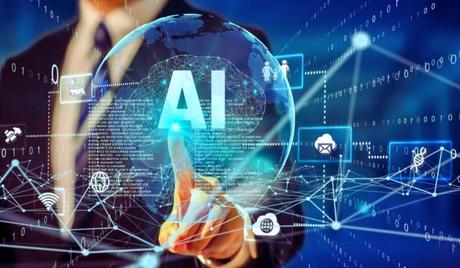Uncover the transformative impact of Artificial Intelligence in Fintech. Explore how AI is reshaping financial services, enhancing efficiency, and driving innovation in the world of finance.
Businesses in the financial sector can use AI to gather and organize data from various sources in order to learn useful things. Banks need help with problems every day when they try to provide services like receiving payments. These new results help them deal with those problems.
The Beginning
Now, we’re living in a time when business and artificial intelligence meet. We go into great detail in this in-depth look at the constantly changing world of AI in Fintech. AI is changing the financial world in ways that have never been seen before. It is changing how banks work and how investments are made.
The Revolution in Fintech
The use of AI in financial technology: a force for progress
In the Fintech business, new ideas are being created all the time because AI and banking technology are coming together. AI’s lightning-fast ability to study huge datasets has given financial companies the power to make choices based on data, lower risks, and improve customer experiences.
Applications That Change Things

Changing how customers feel
In the competitive world of banking, giving customers the best experience possible is very important. Through personalized suggestions and predictive data, AI lets Fintech companies make services fit the needs of each customer, which makes them happier and more loyal.
Read more: Mobile IoT and Its Impact on the Business in 2024
Fraud detection and prevention Security is very important in the business world. AI systems are very important for finding and stopping scams, which protects both financial institutions and their customers from possible risks.
What AI Means for Investment
Using AI in investment strategies: Getting Predictive Analytics to Work
It is now more accurate and faster because AI is being used in investing plans. Investors now have access to information that was previously impossible, thanks to algorithms that look at market trends, evaluate risks, and make the best use of assets.
Giving financial advisors more power to make decisions with the help of AI
Financial experts are using AI to help them make smart choices. Advisors can give clients personalized investment plans that ensure the best results by processing huge amounts of financial data.
Analysis of the Future Market
AI’s ability to predict the future makes real-time market analysis possible. This helps buyers stay on top of trends and make smart choices that will maximize their profits.
Using AI in Fintech: Dealing with Problems and Making Sure Compliance with Regulations

Getting Through the Regulatory Waters
As Fintech innovations grow, it’s more important than ever to know how to deal with the complicated rules that govern them. Because they can handle legal processes, AI tools make it easier for financial companies to follow regulatory rules.
Ethics Things to Think About Keeping ethics and innovation in check
There are moral issues that come up when technology makes big steps forward. AI in Fintech needs a careful balance to make sure that new ideas are morally good. To build faith and confidence, it’s important to find this balance.
At this point, artificial intelligence is very important. It helps financial companies handle regular tasks and get better results on a level higher than human intelligence. Financial companies first used artificial intelligence to find risks, stop scams, simplify daily jobs, and improve service quality. All of these make things run more smoothly and make more money.
Artificial Intelligence in Fintech
What do AI and fintech really mean?
Fintech, or “financial technology,” is new ideas in the financial field that are made possible by technology. It can be anything from keeping track of money transfers to beating scams, as we already said. The huge growth of fintech companies in recent years has given people unique ways to handle their hard-earned cash that wasn’t possible ten years ago. Fintech companies of all kinds use robots that AI drives to do things like helping customers and making sales.
In fact, the growth of banking technology over the past few years has been very important. In fact, traditional banks are now aware of competitive fintech companies and the new technologies they use, such as artificial intelligence and robots, to cut costs and solve problems that customers are having.
Read more: How to Use Machine Learning and AI
What AI can do for your business?
A huge amount of parallels can be found between AI and banking. AI has moved from the edges of the conversation to the middle because it can now learn more and interact with other people better. Due to the rise of international banks over the last few decades, banking has lost some of its human touch. This brings it back. Here are some ways that artificial intelligence may help banks run their businesses better in the banking field.
1. Automating Data and Evaluating Credit Risk
Credit scores that are built on AI may be the most useful and hopeful. Credit scores tell lenders how well a customer can pay their bills and how willing they are to do so.
AI uses many pieces of information to decide on credit scores. These include overall income, credit records, transaction studies, work experience, and more. Credit scores are based on math models that look at a lot of information and use statistical tools to make sense of it all. The result is that credit scores that use AI give sensitive, personalized scores based on a number of other real-time factors. This could make it easier for more people with incomes to get loans.
2. Finding Theft in Banks
Data is looked at with AI-based analytics tools to find deals that don’t seem right and could be signs of scam. Artificial intelligence can be used to keep an eye on users’ habits and actions that aren’t typical. This can help find scam attempts or other problems. The cases are then sent to human workers to be looked at, which saves them a lot of time.
3. Making Things Safer
Many of the ways to make security better in the business world are based on artificial intelligence. For instance, banks have apps that can only be used with a fingerprint or face scan. Artificial intelligence is the main thing that makes this possible.
In fintech, artificial intelligence gives answers based on behavior and has the potential to change the whole financial world. AI can keep an eye on how a customer handles his transactions and figure out what he usually does. If a customer tries to take €5,000 out of his account more than once from a place that isn’t normal, artificial intelligence-driven learning can spot this as a possible scam and stop the transactions.
4. Customer Care that is Automated
Another important area where artificial intelligence tools really help is customer service and relationship management. Chatbots can help fintech companies quickly answer customer questions and make their goods and services better for all of their customers. These robots make it possible for customer service to be personalized for each person and offer free professional advice.
Chatbots can also be available 24 hours a day, seven days a week. Artificial intelligence can also be added to virtual helpers to help customers find their way around the bank’s services, improve user data, and make personalized calls to action to boost focused sales. Bots and virtual helpers help banking companies cut down on customer service costs and time. This will also help make artificial intelligence better by using all of its different skills.
5. Looking at How Users Act
With the help of an interface that combines different AI and machine learning methods, fintech artificial intelligence can guess how a user will act. This gives users a lot of information about their data. These can be helpful for banks and fintech companies. They are also known as AI APIs.
How did we study and improve Bittiq’s buying habits?
For instance, the customer makes a single request for information about his spending over the last month. On the server side, the company uses AI to guess what his follow-up question will be and includes that information in the same answer. This way, the business cuts down on the number of requests and the work that needs to be done on the business system. The customer also gains because the system works faster when the prediction is right.
6. Predictions about Money
When used in banking, AI can find changes in data trends, examine them, and make changes to the way they work on their own. Another thing is that artificial intelligence in finance can still give us useful information about exchange rate investments and predict short- or long-term trends, even if the data isn’t perfect.
AI’s ability to look at unorganized data, which is very important for financial services, is even more amazing. In fintech, this can be used in a number of ways, such as figuring out which products will work best with customers and changing marketing strategies based on what they do.
Some Ways to Use AI

Artificial intelligence can be used in many real-world situations in banking, the financial world, and even in other areas of life. AI’s main purpose is to solve problems, which saves businesses time and money.
A lot of the time, AI is used in the real world to help companies examine data more quickly and cheaply. There is a lot of information out there about customers that businesses, especially banks, keep. They still need to do more with it because it takes a long time to look through and understand all of that info. In this case, AI comes in handy since AI and machine learning can quickly and accurately look at a lot of data.
One specific way that data is used with artificial intelligence is by banks to decide if someone is creditworthy. Banks want to lend money, but they also want to charge the right amount. If they look at the credit scores of potential customers, they can make sure they charge reliable customers and charge safe customers. With AI, they can look at their customer data and figure out what it all means. Artificial intelligence can make different kinds of links from these portfolios. Some clear sources of information are a person’s job and home, but some say that even small things like their email service could show how trustworthy they are.
The study of data by artificial intelligence can also be used to find and stop scams. In addition to what was already said, AI and machine learning systems can respond instantly to the information they are given, look for trends and links, and spot scams. This is very helpful for the financial world. Every hour, a huge number of digital transactions happen, which means that internet security needs to be improved and fraud needs to be found. Fraud analysts can focus on bigger problems because AI does most of the work for them. AI finds smaller problems in the background.
Read more: Exploring the Wonders of Gorilla AI: Unveiling the Future of Artificial Intelligence
Challenges of AI in Fintech
One way that AI can find scams is by finding things that don’t seem right. In the bank example, someone might have tried to apply for 10 loans that were all the same in just 5 minutes. An AI-powered computer would have seen this as strange and thought it was a sign of trouble. The computer has a general idea of what is “normal,” and it can tell when something is not normal and evaluate it.
Automated customer service is another use of artificial intelligence. People are used to seeing chat boxes at the bottom of their screens when they visit different websites. These are chatbots, which are computers that use artificial intelligence to help people. Companies can share their most-asked questions and tell the chatbot what answers to give. For more complicated problems, the company can also tell the chatbot to send the customer to someone else. If you can answer frequently asked questions about your business or the product or service you offer, customers will have a better experience because they can get an answer right away. The business also saves time and money because they don’t have to pay someone to type out answers or have an employee do something else.
FAQs
How does AI change the way digital banking will work in the future?
A: AI is changing digital banking by making the experience better for customers, simplifying tasks, and giving real-time information that helps people make better decisions.
Q: Can trading plans that use AI do better than old-fashioned ones?
A: Yes, AI-powered financial plans use data analytics and prediction algorithms to get better and more accurate information more quickly than traditional methods.
Q: How does AI help stop theft in the Fintech industry?
A: AI finds trends that point to fake activities. Advanced security measures stop illegal entry and transactions.
Q: Are there any problems that come with using AI in Fintech?
A: There are many challenges, such as following the rules, thinking about what is right and wrong, and coming up with new ideas all the time to stay ahead in a world that is changing quickly.
Q: What part does AI play in making banking services more personalized?
A: AI customizes banking services based on each person’s preferences, making suggestions that are more relevant to them and increasing customer happiness as a whole.
Q: How can financial companies make sure that AI is honestly used in Fintech?
A: To ensure ethical practices, financial institutions need to set strong ethical standards, do regular checks, and encourage a mindset of responsible AI use.
The combination of AI and Fintech is changing the financial world in ways that have never been seen before, creating both new possibilities and problems. It’s important to deal with the challenges of this new technology ethically and responsibly. There is no doubt that AI and its endless options will have a big impact on the future of business.
In conclusion
AI, or artificial intelligence, gives the banking sector a unique chance to do many things, such as cut costs, improve the customer experience, and make operations more efficient. Customers of financial companies can get great financial services from these businesses. Different fintech companies around the world use several types of artificial intelligence to improve safety and efficiency. All of these options work toward the same main goal: making financial companies more productive. You can make your staff’s jobs a lot easier by using automation tools like robots and data analysis tools.
However, there is still a need for more skilled AI workers. Because of this, banks are looking for specialized software development firms with engineers who know a lot about fintech. Are you trying to find a group of AI devs who work in fintech? Get in touch with us, and we’ll help you get the most out of these new tools.
